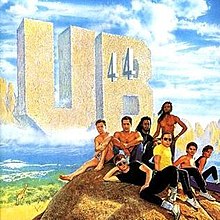Dub is a musical style that grew out of reggae in the late 1960s and early 1970s. It is commonly considered a subgenre of reggae, though it has developed to extend beyond that style. Generally, dub consists of remixes of existing recordings created by significantly manipulating the original, usually through the removal of vocal parts, emphasis of the rhythm section, the application of studio effects such as echo and reverb, and the occasional dubbing of vocal or instrumental snippets from the original version or other works.

UB40 are an English reggae and pop band, formed in December 1978 in Birmingham, England. The band has had more than 50 singles in the UK Singles Chart and has also achieved considerable international success. They have been nominated for the Grammy Award for Best Reggae Album four times and were nominated for the Brit Award for Best British Group in 1984. UB40 have sold more than 70 million records worldwide. The ethnic make-up of the band's original line-up was diverse, with musicians of English, Welsh, Irish, Jamaican, Scottish, and Yemeni parentage.

Signing Off is the debut album by British reggae band UB40, released in the UK on 29 August 1980 by Dudley-based independent label Graduate Records. It was an immediate success in their home country, reaching number 2 on the UK albums chart, and made UB40 one of the many popular reggae bands in Britain, several years before the band found international fame. The politically-concerned lyrics struck a chord in a country with widespread public divisions over high unemployment, the policies of the recently elected Conservative party under Margaret Thatcher, and the rise of the National Front party, while the record's dub-influenced rhythms reflected the late 1970s influence in British pop music of West Indian music introduced by immigrants from the Caribbean after the Second World War, particularly reggae and ska – this was typified by the 2 Tone movement, at that point at the height of its success and led by fellow West Midlands act The Specials, with whom UB40 drew comparisons due to their multiracial band line-up and socialist views.

Wild Orchid is the debut album by the American band Wild Orchid, released in March 1997. It is their most successful album. The album was nominated for two Lady of Soul Awards.

Bustin' Out of L Seven is the second album by the American musician Rick James, released in 1979 through Gordy Records. Included on the album is the top ten R&B hit, "Bustin' Out ". L7 is slang for "square", as in the opening lyrics of "Bustin' Out ", "Well, alright, you squares, it's time you smoked, Fire up this funk and let's have a toke". The letter L and the number 7 form a square.
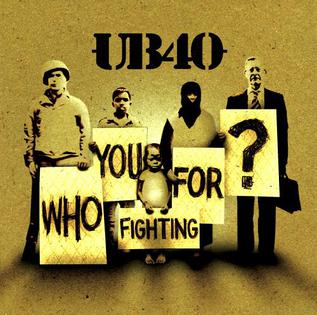
Who You Fighting For? is the fifteenth album by UB40 released on 13 June 2005. The album was nominated for the reggae album Grammy in 2006. It marks the return of the rootsier, political sound that the group cultivated during the early 1980s. It was the band's first release by Rhino Records in the US.
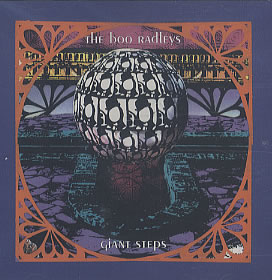
Giant Steps is the third studio album by the Boo Radleys, released in 1993. The title is inspired by John Coltrane's album of the same name, and the record features an assortment of influences — their previous shoegazing sound backed by pop, reggae, noise pop and orchestral sounds.

Feel Me is the sixth album by the funk band Cameo, released in 1980.

"Many Rivers to Cross" is a song written and recorded in 1969 by Jimmy Cliff. It has since been recorded by many musicians, most successfully by UB40, Cher and Annie Lennox.
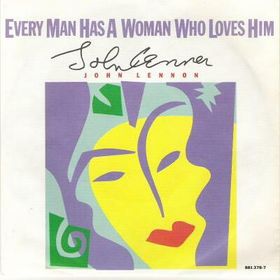
"Every Man Has a Woman Who Loves Him" is a song by Yoko Ono from the album Double Fantasy with John Lennon. Other versions were released, including one released as a single where Ono's voice was removed, leaving what had been Lennon's backing vocal as the primary vocal.

Labour of Love is the fourth studio album by British reggae band UB40, and their first album of cover versions. Released in the UK on 12 September 1983, the album is best known for containing the song "Red Red Wine", a worldwide number-one single, but it also includes three further UK top 20 hits, "Please Don't Make Me Cry", "Many Rivers to Cross" and "Cherry Oh Baby". The album reached number one in the UK, New Zealand and the Netherlands and the top five in Canada, but only reached number 39 in the US on its original release, before re-entering the Billboard 200 in 1988 and peaking at number 14 as a result of "Red Red Wine"'s delayed success in the US.
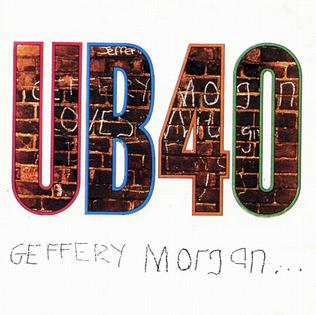
Geffery Morgan is the fifth album by UB40. Released in 1984, it takes its title from a band roadie who had a friend named "Geffery Morgan who ... loved white girls" Following the success of their covers album, Labour of Love, all tracks on this album are self-penned. The album contained the hit "If It Happens Again", which reached No. 9 in the UK Singles Chart.

Present Arms in Dub is a remix album by UB40 released in October 1981. The album contains eight remixed instrumental versions of original tracks from Present Arms and its bonus 12" single; only the tracks "Don't Let It Pass You By" and "Don't Slow Down" are not remixed and included. The album was the first dub album to enter the UK top 40, where it reached number 38 and spent 7 weeks in the chart. The dub style is characterised as a mainly instrumental version of an existing song, typically emphasising the drums and bass.

"Baby, Come Back" is a song by English band the Equals from their 1967 album Unequalled Equals. Written by Eddy Grant, the song was originally released as a B-side in 1966 and was later released as a single in continental Europe before being released as a single in the UK in 1968. "Baby, Come Back" charted in multiple countries, including number 1 on the Belgian, Rhodesian and UK charts in 1967 and 1968.

Cover Up is the fourteenth studio album by English reggae band UB40, released on 22 October 2001 through Virgin Records and DEP International. Recorded with co-producer Gerry Parchment at DEP International Studios in Birmingham, the album followed a musical break for the group. It exemplifies their distinct reggae/pop sound and uses programmed rhythms as the basis for songs; the incorporation of the latter caused friction within the band and singer Ali Campbell later criticised the production style.

Epiphany: The Best of Chaka Khan, Vol. 1 is a compilation album of recordings by American R&B/funk singer Chaka Khan, first released on the Warner Bros. Records label in 1996. Although the compilation, which reached #22 on Billboard's R&B chart and #84 on Pop, was given the "Vol. 1" tag, it remains without a sequel to date.

Homegrown is the sixteenth studio album by English reggae band UB40, released on 3 November 2003 through Virgin Records and DEP International. The follow-up to Cover Up (2001), the album was produced by UB40 at DEP International Studios in Birmingham. Described by Robin Campbell as an old-fashioned UB40 record, Homegrown features both love songs and political numbers. As with Cover Up, its use of programmed rhythms was the cause of musical differences in the band and was later criticised by frontman Ali Campbell.

Greatest Hits is a compilation album by English reggae group UB40, released in 2008. The album includes all 21 tracks from 11 studio albums and the compilation The Best of UB40: Volume Two.

A Real Labour of Love is the second studio album by UB40 featuring Ali, Astro and Mickey. It peaked at number 2 on the UK Albums Chart, making it the highest-charting UB40 album since Promises and Lies, which reached number-one in 1993.

A New Chapter of Dub is an album by English reggae band Aswad, released by Island Records in April 1982. The record is a dub version of Aswad's previous album New Chapter (1981), and was produced by the group with Michael "Reuben" Campbell. Having felt New Chapter under-performed commercially because it was too intricate for mainstream reggae audiences, the group conceived the dub remix album as a way of appealing to core reggae audiences. The record emphasises dub techniques like delay, echo and drop-out and was among the first British dub albums to use tape and digitally-manipulated echo on a horn section. Although not a commercial success, A New Chapter of Dub received critical acclaim and has since been cited by some writers as one of the greatest dub albums of all time.
